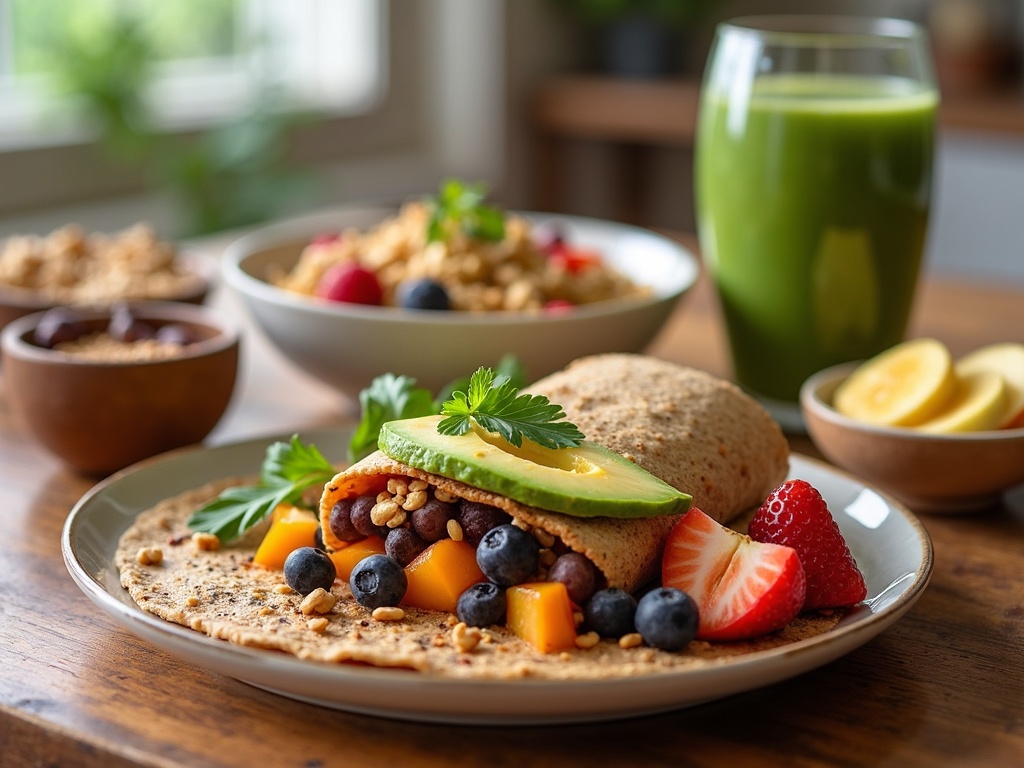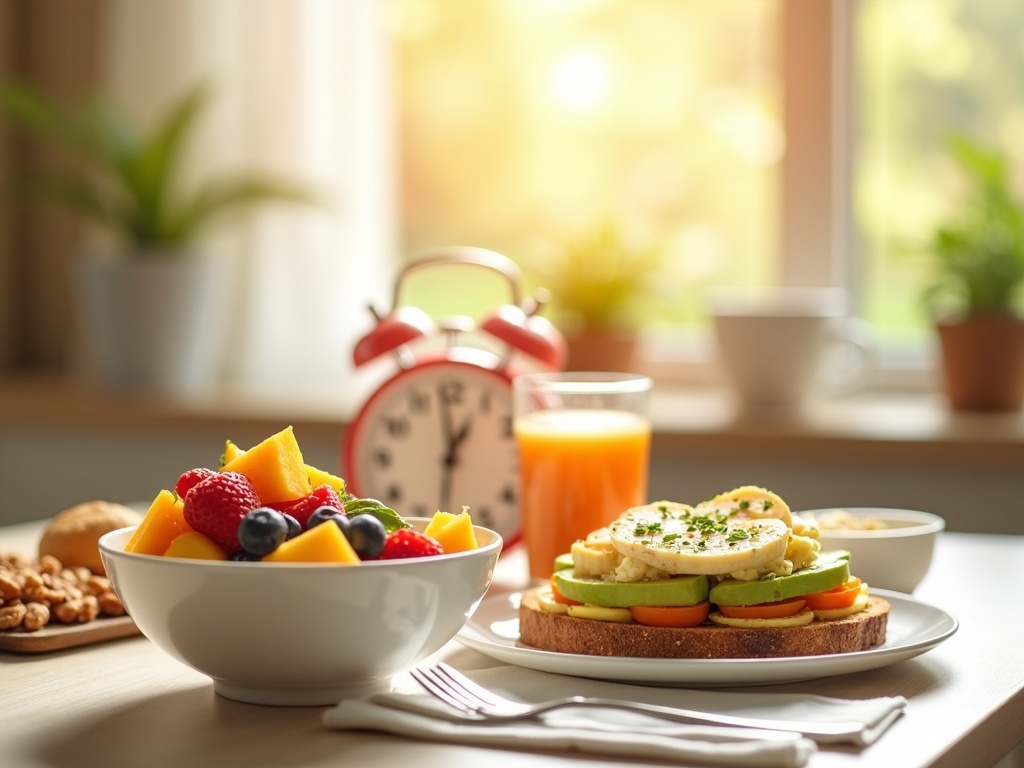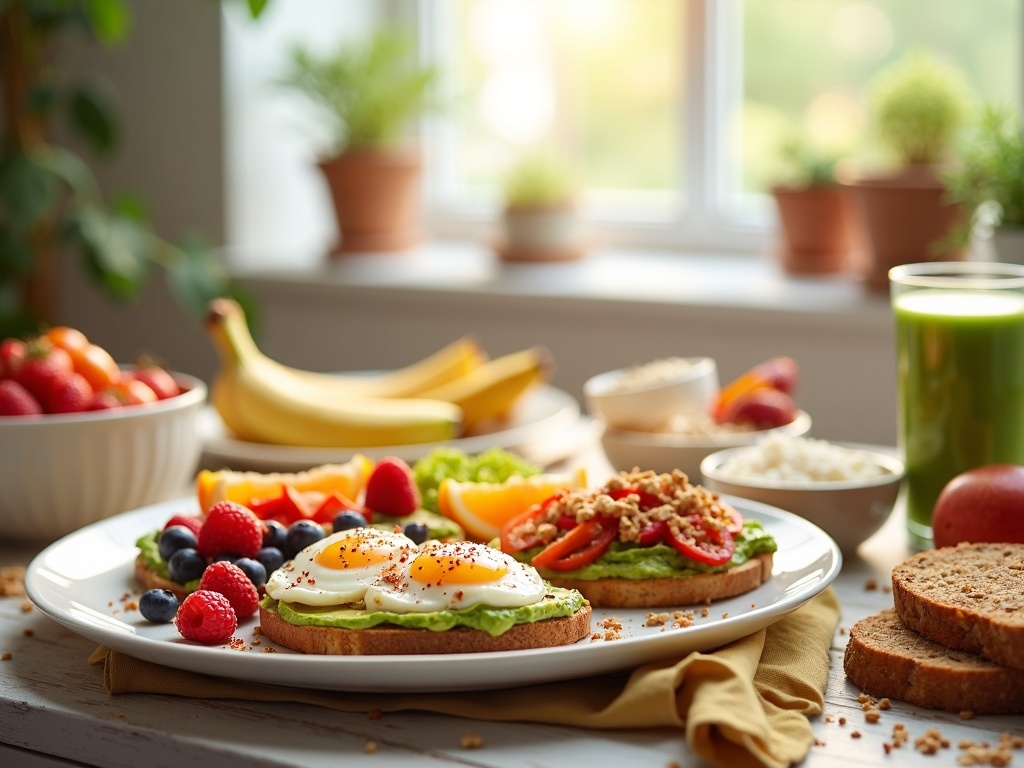A Healthy Breakfast Meals delivers essential fuel after overnight fasting, kickstarts metabolism, and boosts energy, focus, and mood throughout the day. Studies confirm that people who eat breakfast regularly have better concentration, memory, and appetite control, with 70% of Americans rating breakfast as crucial for maintaining daily energy.
Find In This Article
Key Takeaways
- A balanced breakfast should include at least three food groups: whole grains, lean proteins, healthy fats, and fruits or vegetables.
- Protein-rich morning foods like eggs, Greek yogurt, and nut butters help control appetite and reduce unhealthy cravings later in the day.
- Eating breakfast within an hour of waking optimizes metabolic benefits and helps maintain steady energy levels until lunch.
- Preparing breakfast components in advance (overnight oats, chopped fruits, egg muffins) makes healthy options accessible even on busy mornings.
- Children and teenagers benefit even more from nutritious breakfasts, showing improved academic performance, attention spans, and healthier weights.
Why A Healthy Breakfast Meals Matters for Your Day
Starting my day with a healthy breakfast has completely transformed my morning routine and overall wellbeing. I’ve noticed significant improvements in my energy levels, focus, and even my mood throughout the day. This isn’t just my personal experience – science backs up these benefits.
A recent IFIC survey revealed that 70% of Americans consider breakfast vital for maintaining daily energy levels. This statistic doesn’t surprise me at all. When I skip breakfast, I feel sluggish and unfocused, often reaching for unhealthy snacks by mid-morning.
Key Benefits of Starting Your Day Right
The advantages of eating a nutritious morning meal extend far beyond just satisfying hunger. Research shows that people who eat breakfast regularly experience improved concentration and memory. Your brain needs fuel after the overnight fast, and providing it with nutrients helps cognitive function throughout the day.
Your metabolism also gets a significant boost from a morning meal. By eating within the first few hours of waking, you kickstart your body’s calorie-burning processes. This is why many healthy breakfast foods can support your weight management goals rather than hinder them.
Speaking of weight management, a protein-rich breakfast helps control appetite and reduces cravings later in the day. I’ve found that including protein sources like eggs, Greek yogurt, or nut butters in my morning meal keeps me satisfied until lunch, preventing those impulsive snack choices.
Another crucial benefit is heart health. Heart-healthy breakfast options high in fiber from whole grains, fruits, and seeds can help lower cholesterol levels and improve cardiovascular function. Oatmeal topped with berries and flaxseeds is one of my go-to choices for this reason.
The quality of your breakfast matters just as much as having one. These healthy breakfast options deliver the most benefits:
- Whole grains (oatmeal, whole grain toast, quinoa) for sustained energy
- Lean proteins (eggs, Greek yogurt, tofu) for muscle maintenance and satiety
- Healthy fats (avocado, nuts, seeds) for brain function and inflammation reduction
- Fruits and vegetables for vitamins, minerals, and fiber
I’ve discovered that the best healthy breakfast combinations include at least three of these food groups. This ensures you’re getting a balanced mix of nutrients to power your morning.
For busy mornings, I rely on easy healthy breakfast ideas that can be prepared in minutes or even the night before. Overnight oats, smoothie packs, and egg muffins have saved me countless times when I’m rushing out the door.
The timing of breakfast also plays a role in its effectiveness. Eating within an hour of waking optimizes the metabolic benefits. However, if you’re not hungry immediately after waking, it’s fine to wait a bit – just try not to delay beyond mid-morning.
Children and teenagers benefit even more from a nutritious breakfast. Studies consistently show that kids who eat breakfast perform better in school, have improved attention spans, and maintain healthier weights than those who skip it.
By making breakfast a non-negotiable part of my daily routine, I’ve experienced firsthand how this simple habit sets a positive tone for healthier choices throughout the day. The combination of immediate energy and long-term health benefits makes it one meal I never skip.
Essential Ingredients for a Power-Packed Morning
Starting my day with the right breakfast ingredients transforms my energy levels and sets a positive tone for everything that follows. I’ve discovered that stocking my kitchen with nutrient-dense foods makes creating healthy breakfast options much easier. Let’s explore the essential components that should be part of your morning meal rotation.
Foundation Foods for Morning Nourishment
Rolled or steel-cut oats serve as an excellent breakfast base. I always opt for varieties without added sugars to avoid unnecessary sweeteners. These whole grains provide complex carbohydrates that release energy slowly throughout the morning, keeping me satisfied longer. They’re incredibly versatile too – perfect for overnight oats, warm porridge, or added to smoothies.
Greek yogurt has become my morning staple for protein. Choosing unsweetened varieties gives me maximum nutritional benefits without added sugars. With roughly twice the protein of regular yogurt, it keeps hunger at bay until lunchtime. I often top mine with fresh fruits for natural sweetness.
Eggs remain unbeatable for morning protein and essential nutrients. They’re packed with vitamins D, B12, and high-quality protein that supports muscle maintenance. I prepare them scrambled, poached, or as part of a veggie-filled omelet for variety in my easy healthy breakfast routine.
Avocados deliver healthy fats that keep me satisfied. Half an avocado provides fiber, potassium, and monounsaturated fats that support heart health. I love smashing it on whole grain toast or slicing it into egg dishes for added creaminess.
Fresh fruits add vital vitamins, minerals, and natural sweetness to any breakfast. These foods I frequently include:
- Berries (blueberries, strawberries) for antioxidants and lower sugar content
- Bananas for portable energy and potassium
- Apples for fiber and satisfying crunch
- Citrus fruits for vitamin C and immune support
Nuts and seeds pack tremendous nutritional value into small packages. Almonds provide protein and healthy fats, while chia seeds offer omega-3 fatty acids and fiber. Walnuts contain brain-boosting nutrients that enhance cognitive function. Just a small handful adds texture, flavor, and nutrition to heart healthy breakfast options.
Whole grain bread serves as the foundation for countless quick morning meals. Unlike refined white bread, whole grain varieties retain the bran and germ, providing more fiber, vitamins, and minerals. I look for products listing “whole grain” as the first ingredient.
Leafy greens might seem unconventional for breakfast, but spinach or kale can be seamlessly incorporated into morning routines. I add them to smoothies, omelets, or breakfast wraps for an early dose of iron, calcium, and antioxidants without overwhelming flavor.
Creating a best healthy breakfast doesn’t require all these ingredients at once. I mix and match based on time constraints and preferences. The key is balance – combining protein, complex carbohydrates, and healthy fats creates sustained energy.
For busy mornings, I prepare ingredients in advance. Chopping fruits, portioning yogurt, or cooking a batch of oats saves precious time while maintaining nutritional quality. This advance planning helps me avoid falling back on less nutritious grab-and-go options.
By keeping these core ingredients on hand, I’ve found that healthy breakfast foods become the default rather than the exception. Each morning meal becomes an opportunity to fuel properly for the day ahead, not an afterthought or missed opportunity. The right healthy breakfast ingredients make all the difference between starting the day energized versus dragging through the morning hours.
Quick and Easy Breakfast Recipes
Starting your day with a healthy breakfast doesn’t have to be time-consuming. I’ve collected some quick recipes that pack a nutritional punch while fitting into your busy morning routine.
No-Cook Morning Favorites
Overnight Oats (15g protein)
This make-ahead breakfast saves precious morning minutes. In a mason jar, combine:
- ½ cup rolled oats
- ¾ cup milk (dairy or plant-based)
- 1 tablespoon chia seeds
- 1 tablespoon honey or maple syrup
- ¼ teaspoon vanilla extract
Mix thoroughly, seal the jar, and refrigerate overnight. In the morning, top with fresh berries, sliced banana, or a tablespoon of nut butter for extra flavor and nutrition. The protein content comes primarily from the oats and milk, with the chia seeds adding an omega-3 boost.
Avocado Toast (14g protein)
This trendy breakfast deserves its popularity for good reason:
- Toast two slices of whole grain bread until golden
- Mash half a ripe avocado with a fork
- Spread avocado evenly on toast
- Top with two poached eggs
- Sprinkle with salt, pepper, and red pepper flakes
For variations, try adding cherry tomatoes, microgreens, or a drizzle of olive oil. The eggs provide high-quality protein while the avocado offers healthy fats.
Hot Breakfast Options
Vegetable Omelet (21g protein)
This protein powerhouse takes less than 10 minutes:
- Whisk 3 eggs with a splash of milk, salt and pepper
- Heat a non-stick pan with olive oil over medium heat
- Pour in egg mixture
- When edges set, add ¼ cup diced bell peppers, 2 tablespoons chopped onions, and a handful of spinach
- Fold omelet in half when eggs are nearly set
- Top with 2 tablespoons feta cheese
The protein comes mainly from the eggs, with a boost from the cheese. This heart-healthy breakfast delivers vitamins and minerals from the vegetables.
Smoothie Bowl (18g protein)
For a refreshing yet filling option:
- Blend 1 frozen banana, ½ cup frozen berries, 1 scoop protein powder, and ¾ cup milk
- Pour into a bowl
- Top with 2 tablespoons granola, 1 tablespoon sliced almonds, and fresh fruit
The protein comes from the powder and milk, while the toppings add texture and additional nutrients. For easy healthy breakfast variations, try different fruit combinations or swap in yogurt for some of the milk.
Creative Breakfast Alternatives
Starting my mornings with the same breakfast routine got boring fast. That’s why I’ve explored some creative alternatives that pack a nutritional punch while keeping my taste buds excited. These healthy breakfast options aren’t just delicious—they’re designed to fuel your day with sustained energy.
Wholesome Morning Creations
The sweet potato and black bean breakfast burrito has become my go-to when I need something hearty and satisfying. I start by roasting sweet potato cubes with a touch of olive oil and spices until they’re caramelized. Meanwhile, I sauté black beans with garlic, cumin, and a squeeze of lime. Once everything’s ready, I wrap it all in a whole grain tortilla with some scrambled eggs, avocado slices, and a sprinkle of fresh cilantro. This power-packed burrito delivers complex carbs, plant-based protein, and healthy fats in every bite.
Chia seed pudding has revolutionized my breakfast prep. I mix 3 tablespoons of chia seeds with a cup of almond milk, add a drizzle of honey or maple syrup, and a dash of vanilla extract. After stirring well, I leave it in the fridge overnight. By morning, the mixture transforms into a delightful pudding-like consistency. I top it with fresh berries, sliced bananas, and a sprinkle of nuts for extra crunch. This easy healthy breakfast is loaded with omega-3 fatty acids, fiber, and antioxidants—perfect for busy mornings.
The quinoa breakfast bowl has changed how I think about this ancient grain. I cook quinoa in almond milk with a cinnamon stick for flavor, then store it in the fridge. Each morning, I reheat a portion and customize it with toppings like sliced apples, toasted walnuts, a drizzle of honey, and a sprinkle of cinnamon. The versatility of this best healthy breakfast bowl means I never get bored, and the complete protein in quinoa keeps me full for hours.
Smoothies have endless possibilities when you focus on protein content. I blend frozen banana, spinach, almond butter, Greek yogurt, and a splash of almond milk for a creamy green smoothie that delivers around 20g of protein. For variety, I switch between different fruit combinations—mixed berries for antioxidants, mango and pineapple for tropical flavor, or apple and cinnamon for a fall-inspired drink. Adding a scoop of protein powder can boost the protein content even further, making these healthy breakfast foods perfect for post-workout mornings.
What makes these alternatives truly stand out is their nutrient density and fiber content. Each option provides a balance of macronutrients along with essential vitamins and minerals. The fiber from whole grains, fruits, vegetables, and seeds helps regulate blood sugar levels, preventing the mid-morning crash that often follows traditional breakfast choices like sugary cereals or pastries.
I’ve noticed significant improvements in my energy levels since incorporating these healthy breakfast alternatives into my routine. The combination of complex carbohydrates, protein, and healthy fats creates a balanced meal that releases energy slowly throughout the morning. This has helped me stay focused and productive until lunchtime without reaching for snacks.
These breakfast options also support heart healthy breakfast goals by incorporating ingredients that promote cardiovascular health. The fiber in oats and chia seeds, healthy fats from avocados and nuts, and antioxidants from fruits and vegetables all contribute to heart health while satisfying hunger.
By preparing components ahead of time—roasting sweet potatoes, cooking quinoa, or setting up chia pudding overnight—I’ve found that these creative alternatives can actually save time during busy mornings. This advance prep turns seemingly complex breakfast ideas into quick, grab-and-go options that fit seamlessly into hectic schedules while providing far more nutrition than standard breakfast fare.

Common Breakfast Pitfalls to Avoid
Starting your day without breakfast sets you up for trouble. I’ve seen how this seemingly innocent habit can cascade into poor eating choices throughout the day. When you skip your morning meal, your body experiences heightened hunger signals later, often leading to overeating at lunch or mindless snacking on whatever’s convenient. This pattern typically results in consuming more calories than if you’d eaten a healthy breakfast to begin with.
The Processed Food Problem
Processed breakfast items might seem convenient, but they come with significant drawbacks:
- High sodium content that contributes to water retention and blood pressure issues
- Excessive added sugars that cause energy crashes mid-morning
- Artificial ingredients that offer little nutritional value
- Refined carbohydrates that spike blood sugar levels quickly
These items might save you time, but they cost you in sustained energy. Instead, I recommend focusing on whole, nutritious breakfast foods that provide lasting fuel for your day.
Portion control remains another critical factor many overlook. Even when choosing healthy breakfast options, eating too much can leave you feeling sluggish rather than energized. I suggest using smaller plates and being mindful of serving sizes, particularly with calorie-dense foods like nuts, granola, or avocados.
Protein deserves special attention in your morning routine. A heart-healthy breakfast with adequate protein helps maintain muscle mass and keeps hunger at bay. Research shows that consuming 20-30 grams of protein at breakfast significantly improves satiety compared to lower-protein alternatives. Good sources include eggs, Greek yogurt, cottage cheese, or plant-based options like tofu scrambles and legumes.
The timing between breakfast and lunch matters too. An easy healthy breakfast consumed within an hour of waking helps regulate your appetite until midday. Without this foundation, you’ll likely experience intense hunger pangs before lunch, making unhealthy choices more tempting.
I’ve found that the best healthy breakfast combines protein, complex carbohydrates, and healthy fats to provide sustained energy release. This combination prevents the mid-morning energy crashes that often lead to coffee shop pastries or vending machine visits.
By avoiding these common breakfast pitfalls, you’ll set yourself up for better energy levels, improved concentration, and more consistent eating patterns throughout the day. The key lies in preparation—taking just a few minutes to plan your morning meal can transform your entire day.

Customizing Your Morning Meal
Starting my day with a healthy breakfast sets the tone for everything that follows. I’ve learned that personalizing morning meals keeps them exciting and aligned with my nutritional needs. The beauty of breakfast is its flexibility—almost any recipe can be tweaked to fit specific dietary needs or seasonal availability.
Adapting for Dietary Needs and Preferences
Dietary restrictions don’t have to limit breakfast enjoyment. For gluten-free options, I swap traditional oats for certified gluten-free varieties or use almond flour instead of wheat in pancakes. Plant-based eaters can replace eggs with tofu scrambles or use chia seeds mixed with water as an egg substitute in baking.
Seasonal adjustments keep healthy breakfast options fresh and affordable. Here’s how I modify recipes throughout the year:
- Spring: Add fresh berries to yogurt bowls and incorporate tender greens into smoothies
- Summer: Feature stone fruits in overnight oats and use garden-fresh tomatoes in savory breakfast bowls
- Fall: Incorporate roasted pumpkin into pancake batter and add apple slices to oatmeal
- Winter: Mix citrus segments into grain bowls and use frozen summer berries in smoothies
Morning rush shouldn’t compromise nutrition. I prep ingredients the night before—chopping fruits, portioning nuts, or assembling dry ingredients for quick cooking. Easy healthy breakfast options like overnight oats require just minutes of evening prep for grab-and-go convenience.
For busy weeks, meal prepping breakfast components saves precious morning time. I store prepared items properly to maintain freshness:
- Cooked grains: Refrigerate in airtight containers for 3-4 days
- Cut fruits: Store separately in sealed containers with paper towels to absorb moisture
- Portioned nuts and seeds: Keep in small containers at room temperature
- Breakfast burritos: Wrap individually in parchment paper then foil and freeze for up to 3 months
Breakfast burnout happens when we eat the same foods repeatedly. I keep things interesting by creating a rotation of best healthy breakfast options. Monday might feature savory avocado toast, Tuesday could bring fruity smoothie bowls, while Wednesday introduces hearty grain bowls.
The “breakfast bar” approach works wonderfully for families—setting out several healthy breakfast foods and letting everyone build their own meal. This ensures everyone gets what they need while encouraging experimentation with new flavor combinations.
These customization strategies transform ordinary mornings into opportunities for heart-healthy breakfast experiences that adapt to changing seasons, schedules, and preferences.

Sources:
International Food Information Council (IFIC), “Breakfast: A Vital Component for Energy Levels”
American Journal of Clinical Nutrition, “Impact of Breakfast on Health and Performance”

